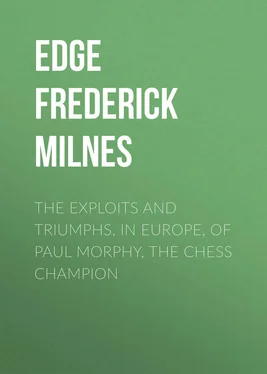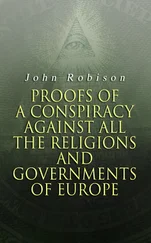Frederick Edge - The Exploits and Triumphs, in Europe, of Paul Morphy, the Chess Champion
Здесь есть возможность читать онлайн «Frederick Edge - The Exploits and Triumphs, in Europe, of Paul Morphy, the Chess Champion» — ознакомительный отрывок электронной книги совершенно бесплатно, а после прочтения отрывка купить полную версию. В некоторых случаях можно слушать аудио, скачать через торрент в формате fb2 и присутствует краткое содержание. Жанр: Развлечения, foreign_antique, foreign_prose, на английском языке. Описание произведения, (предисловие) а так же отзывы посетителей доступны на портале библиотеки ЛибКат.
- Название:The Exploits and Triumphs, in Europe, of Paul Morphy, the Chess Champion
- Автор:
- Жанр:
- Год:неизвестен
- ISBN:нет данных
- Рейтинг книги:4 / 5. Голосов: 1
-
Избранное:Добавить в избранное
- Отзывы:
-
Ваша оценка:
- 80
- 1
- 2
- 3
- 4
- 5
The Exploits and Triumphs, in Europe, of Paul Morphy, the Chess Champion: краткое содержание, описание и аннотация
Предлагаем к чтению аннотацию, описание, краткое содержание или предисловие (зависит от того, что написал сам автор книги «The Exploits and Triumphs, in Europe, of Paul Morphy, the Chess Champion»). Если вы не нашли необходимую информацию о книге — напишите в комментариях, мы постараемся отыскать её.
The Exploits and Triumphs, in Europe, of Paul Morphy, the Chess Champion — читать онлайн ознакомительный отрывок
Ниже представлен текст книги, разбитый по страницам. Система сохранения места последней прочитанной страницы, позволяет с удобством читать онлайн бесплатно книгу «The Exploits and Triumphs, in Europe, of Paul Morphy, the Chess Champion», без необходимости каждый раз заново искать на чём Вы остановились. Поставьте закладку, и сможете в любой момент перейти на страницу, на которой закончили чтение.
Интервал:
Закладка:
Frederick Milnes Edge
The Exploits and Triumphs, in Europe, of Paul Morphy, the Chess Champion
I am much indebted, in the following pages, to the kind assistance of that able writer and veteran chess-player, Mr. George Walker, who has furnished me with most of the very interesting and valuable information contained in the fourth chapter of this work. I am likewise under obligations to Herr Löwenthal for many anecdotes relating to chess celebrities of the past, and other information; and also to Mr. George Medley, Honorary Secretary of the London Chess Club, and Mr. Ries, of the Divan.
The cuts with which this work is embellished have been engraved by the well-known Brothers Dalziel. The portrait of Paul Morphy, copied from a photograph taken shortly after his arrival in London last year, is an excellent likeness.
The portraits of Messrs. Staunton, Boden, Anderssen, and Löwenthal, are copies of photographs, for which they sat at the Manchester Meeting, in 1857. The originals of Messrs. Saint Amant and Harrwitz are admirably executed lithographs of those gentlemen, taken about four years ago, and that of Mr. Mongredieu is copied from a photograph kindly lent for the purpose.
I am under great obligations to Mr. Lewis, who came to London expressly to sit for his likeness; and I feel assured that my readers will value this "very form and feature" of an amateur who was famous before Labourdonnais was known outside the Régence; and whose works are found in every chess-player's library.
I had considerable difficulty in obtaining the portrait of Mr. George Walker. Photographs, lithographs, etc., of that most popular of all chess writers, did not exist, and many friends prophesied that his likeness would not be in my book. But I importuned him so that he relented, and confided to my care an oil painting, for which he sat five years ago, and which was the only portrait of him in existence.
My readers can judge of the resemblance of the other cuts by the portrait of Paul Morphy. I only wish my story was as good.
CHAPTER I
MORPHY'S FIRST GAMES
Paul Morphy's father, Judge Morphy, of the Supreme Court of Louisiana, beguiled his leisure hours with the fascinations of Chess, and, finding a precocious aptitude for the game in his son, he taught him the moves and the value of the various pieces. In the language of somebody, —
"To teach the young Paul chess,
His leisure he'd employ;
Until, at last, the old man
Was beaten by the boy."
I have here spoilt a very pretty story. The report in chess circles is, that the young Paul learned the moves from seeing his father play with his uncle, Mr. Ernest Morphy, long ranking amongst the first players in the Union, and one of the brightest living ornaments of American chess. One evening – so runs the tale – this gentleman awaited the arrival of the Judge, when Master Paul impudently offered to be his antagonist. What was the uncle's astonishment at finding the stripling a match for his deepest combinations, and what the father's surprise on discovering a very Philidor in his son of ten years! Deschapelles became a first-rate player in three days, at the age of something like thirty. Nobody ever believed the statement, not even Deschapelles himself, although his biographer declares he had told the lie so often that he at last forgot the facts of the case. But the story about Morphy beats the Deschapelles story in the proportion of thirty to ten. I sorrowfully confess that my hero's unromantic regard for truth makes him characterize the above statement as a humbug and an impossibility.
Paul's genius for Chess was, very properly, not permitted to interfere with his educational pursuits. At college (in South Carolina) until eighteen years of age, he had but little time for indulgence in his favorite game, nor did he find any one capable of contending with him. When the vacations allowed of his playing against such adepts as his father and uncle, or such well-known paladins as Mr. Ernest Rousseau, of New Orleans, and Judge Meek, of Alabama, he soon showed himself superior to all antagonists. In the autumn of 1849, Herr Löwenthal, the celebrated Hungarian player, visited the Crescent City, and out of three games against the young Paul, then but twelve years old, he lost two and drew one. It is but reasonable to suppose that the desire of atoning for this defeat had something to do with Herr Löwenthal's challenging his youthful victor, on his arrival last year in Europe.
CHAPTER II
THE FIRST AMERICAN CHESS CONGRESS
A circular was issued by the New York Chess Club, in the month of April, 1857, "for the purpose of ascertaining the feasibility and propriety of a general assemblage of the chess players resident in America." This "met with a hearty and zealous response from the amateurs and clubs of the United States. So favorable was the feeling everywhere manifested, that it was deemed advisable to proceed with the undertaking, and to complete at once the preliminary arrangements." 1 1 Prospectus of "The National Chess Congress."
In consideration of the movement having been initiated by the New York Chess Club, it was conceded that the meeting should take place in that city.
Some of the founders of the New York Chess Club still live to do honor to the game. I believe that Mr. James Thompson and Colonel Mead suckled the bantling in times of yore, sometimes forming the entire of the Club without assistance. In that day of small things, I believe, too, they defeated the Norfolk (Va.) Club, proving themselves just two too many for their opponents. Then they travelled about from house to house, as their members increased, with the arrival of Mr. Charles H. Stanley, Mr. Frederick Perrin, and others. About 1855 or 1856, the Club made the acquisition of two enterprising young players, Mr. Theodore Lichtenhein and Mr. Daniel W. Fiske; and to the latter gentleman is due the credit of first suggesting this Chess Congress, which made known to fame the genius of Paul Morphy.
In the summer of 1857, being then engaged on the New York Herald, I used occasionally to tumble into the basement of an edifice opposite the newspaper office, where a jolly, fat German, with a never-to-be-remembered name, regaled his visitors upon sausages and "lager." Here the members of the Chess Club were wont to congregate; for the landlord had provided chessmen and boards as an inducement to visitors.
One afternoon being engaged in a game with a brother reporter, a gentleman, whom I subsequently learned was Mr. Theodore Lichtenhein, stepped up to us, and put into our hands the prospectus of the approaching Chess Congress, stating his opinion that an event of so much importance merited newspaper publicity. So began my acquaintance with American chess amateurs. Although possessing but little skill as a player, I had a strong liking for the game, and determined that every thing in my power should be done to render the meeting successful.
My visits to the saloon, and eventually to the Club, became frequent, and the Committee of Management, finding that I both could and would work, did me the honor of appointing me one of the secretaries.
The Congress was advertised to open on the 6th of October, but players began to arrive some weeks previously. First of all came Judge Meek, of Alabama, a truly imposing specimen of a man. Soon after him followed Mr. Louis Paulsen, from Dubuque, Iowa, whose astonishing blindfold feats out West were the theme of general talk, and almost total disbelief, amongst Eastern players. From Judge Meek we first heard of Paul Morphy's wondrous strength. He told the New York Club that if the youthful Louisianian entered the tournament, he would infallibly wrest the palm of victory from all competition.
Читать дальшеИнтервал:
Закладка:
Похожие книги на «The Exploits and Triumphs, in Europe, of Paul Morphy, the Chess Champion»
Представляем Вашему вниманию похожие книги на «The Exploits and Triumphs, in Europe, of Paul Morphy, the Chess Champion» списком для выбора. Мы отобрали схожую по названию и смыслу литературу в надежде предоставить читателям больше вариантов отыскать новые, интересные, ещё непрочитанные произведения.
Обсуждение, отзывы о книге «The Exploits and Triumphs, in Europe, of Paul Morphy, the Chess Champion» и просто собственные мнения читателей. Оставьте ваши комментарии, напишите, что Вы думаете о произведении, его смысле или главных героях. Укажите что конкретно понравилось, а что нет, и почему Вы так считаете.












